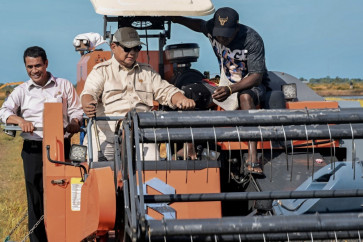Popular Reads
Top Results
Can't find what you're looking for?
View all search resultsPopular Reads
Top Results
Can't find what you're looking for?
View all search resultsJumhur calls report on migrant workers misleading, exaggeration
The government of President Susilo Bambang Yudhoyono has been often criticized for not adequately aiding Indonesian migrant workers (TKI) in trouble overseas
Change text size
Gift Premium Articles
to Anyone
T
he government of President Susilo Bambang Yudhoyono has been often criticized for not adequately aiding Indonesian migrant workers (TKI) in trouble overseas. Migrant Care, an NGO, recently said that 420 TKI were on death row in a number of countries and that the government had done little to help them. The head of the National Agency for Overseas Labor Placement and Protection (BNP2TKI), Jumhur Hidayat, recently talked to The Jakarta Post's Max Sijabat about how the government could better help its citizens working overseas.
Question: What is your response to Migrant Care's report?
Answer: As a former activist, I have to say that NGOs and activists at times have to be outspoken to be heard by the public. But they are telling a lie. Its information is misleading and the figures are an exaggeration.
According to our latest data, the number of Indonesian citizens facing death sentences is 223: 171 in Malaysia, 28 in Middle East, 22 in China and two in Singapore. And 80 percent of the 171 of our citizens in Malaysia and all the 22 in China are not migrant workers but narcotics smugglers.
The government is still working hard to help migrant workers who are facing death sentences. Two workers facing death charges in Singapore will likely be acquitted because they were minors, while the labor exporter who sent them to Singapore has been tried in Semarang, Central Java.
How many Indonesians are on death row overseas awaiting execution?
Only two, not five, are waiting to be executed. The government is lobbying the Saudi Arabian government to commute the sentences to life imprisonment. The [TKI] were identified as Satinah binti Jumadi and another person sentenced to death for killing her employer's four-year-old daughter in Yanbu, Saudi Arabia, last September.
Satinah was sentenced to death after she was proven guilty of beating to death her female employer. The government is still lobbying the Saudi Arabian King to suspend the execution while waiting for a pardon from the victims' families. The government has offered a significant amount of cash in blood money [compensation] to get the pardon.
Why did the government not extend the tenure of the presidential task force on migrant workers? Was it a failure?
The task force, which has worked with six ministries, succeeded in saving a total of 122 workers from death row in 2011 and 2012. The task force also identified problems befalling workers in their workplace and hired professional lawyers in countries where Indonesian workers were employed.
Saving 122 death convicts from execution within two years is hard work and really is an impressive performance. One of the more important successes of the task force has been its ability to develop networks, mainly with the Foreign Ministry, Indonesian embassies and professional lawyers, to provide legal assistance to distressed workers.
What lessons can we learn from the ongoing review of the 2004 law on labor placement and protection?
Migrant workers in the informal sector need their own special law because they are employed not under the labor law in their countries of destination, but are included under their employers' families. All those who will be employed as domestic helpers, gardeners and baby sitters should undergo intensive training for at least 400 hours, instead of the current 200 hours, in language and work skills, and their abilities should be certified not only to ensure their competence but also to improve their bargaining position.
What are the implications of the 1990 UN International Convention on the Protection of the Rights of All Migrant Workers on the law's review?
Indonesia also has had to honor the rights of migrant workers working in the country since it ratified the convention. But the country can also use articles from the convention as clauses in labor contracts signed by foreign employers and Indonesian migrant workers abroad. This is why Indonesia imposed a labor supply moratorium for five countries, Saudi Arabia, Kuwait, Jordan, Syria and Malaysia, because they declined to include details from the convention in the labor contracts, or on workers' rights on the issues of daily working hours, days off, reproductive rights and freedom from violence and intimidation.
What has been the moratorium's impact on labor cases and foreign remittances?
The labor supply continues to decrease from 644,731 in 2008 to 632,172 in 2009, 575,804 in 2010, 586,802 in 2011 and 494,609 in 2012 and the number of troubled workers went down from 2,864 in 2008 to 2,600 in 2009, 2,466 in 2010, 685 in 2011 and 299 in 2012 while foreign remittances have remained constant around US$6.7 billion annually in the past three years.










